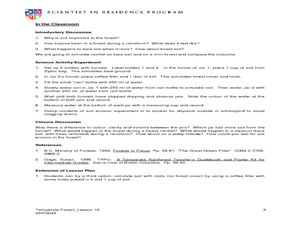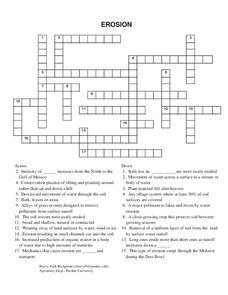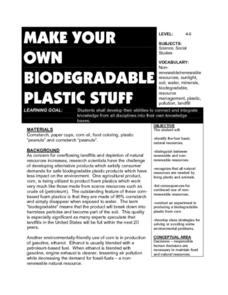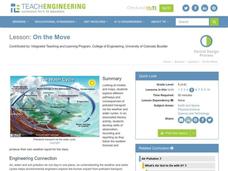Curated OER
Water Filtration Challenge
Students create an all-natural water filtration system. For this lesson on natural water filtration, students build upon prior knowledge to build a filtration unit made of plants, soils, sand, pebbles and rocks that can purify...
Curated OER
Recycling
Third graders observe the importance of recycling. For this environmental lesson, 3rd graders will view experiments on water filtration, paper-making, and breathing pollutants, and will categorize recyclable materials.
Curated OER
Water Filtration Competition
Students design water filtration systems. They draw sketches and write paragraphs about their systems. After presenting their systems to the class, each group then builds their system and determines its effectiveness for purifying...
Curated OER
Forest as a Filter
Students experiment using soil and water. In this forest as a filter lesson, students identify the role of forest cover, vegetation, and foliage impacts erosion and evaporation. Students conduct a simple experiment, form a hypothesis,...
Curated OER
Water Filtration
In this water pollution and filtration lesson plan, 5th graders read the story 'Saving Salila's Turtle' and discuss the impact pollution has had on the Ganges river. Students work in groups to brainstorm different types of water...
Curated OER
Freddy the Fish
Students complete an experiment. In this water pollution instructional activity, students brainstorm information about river habitats and water pollution. Students then read the story Freddy the Fish and complete an experiment where...
Curated OER
Splish, Splash, I was Takin' a Bath!
Students explore the causes of water pollution and its effects on the environment through the use of models and scientific investigation. In the accompanying activities, they investigate filtration and aeration processes as they are used...
Curated OER
Air Matters
Students research the affects that particulate matter has on the quality of our air and our health. Students analyze a streaming video on air pollution and complete an internet research assignment to find ways to reduce particulate...
Curated OER
Particulate Matter
Seventh graders examine the different types of pollutants. In this environmental science lesson, 7th graders observe particulate matter under a microscope. They explain how these can affect once health when breathed in large quantities...
Curated OER
Super Stream Keeper's
Students are introduced to Delaware's waterways as precious resources used for drinking water, water for agricultural and industrial uses, recreational areas, and as habitats for wildlife. They are introduced to wastewater discharges,...
Curated OER
Watershed Landscape
Students demonstrate how water flows by building a human watershed using themselves. In this ecology instructional activity, students compare and contrast point-source and non-point source pollution. They write what they have learned...
Curated OER
Water Works Wonders
Students examine where water is found in the world, how we use it, and the various forms it takes. They observe the refraction of light through a prism, record the day and night sky over a week's time, and create a topographic model of...
Kenan Fellows
Terrarium in a Bottle: Modeling the Atmosphere, Greenhouse Effect, and Water Cycle
You've heard of farm to table ... but what about farm in classroom? Junior agriculturalists embark upon a two-week journey into the science of growing things. Based upon the classic terrarium in a two-liter experiment, the lesson goes...
California Academy of Science
Pollution in Our Watershed
The concept of a how pesticides and other chemicals pass through a watershed can be difficult for younger learners to grasp without a concrete example. In the activity here, some blank paper, markers, and a spray bottle are all you need...
Kenan Fellows
Sustainability: Learning for a Lifetime – The Importance of Water
Water is essential for life—and understanding the importance of clean drinking water is essential in understanding sustainability! Show your environmental science class the basics of water testing and treatment through a week-long...
DiscoverE
Clean It Up
Water, water, everywhere, but not a drop to drink—until we clean it, of course! Scholars design a filtration device that removes pollutants from water. The goal is to have the water come out as clean as possible from the device. How...
Kenan Fellows
Making Connections with Water Quality
What's in your water? And, why is water quality so important? Enhance your class's level of water appreciation through a lesson that demonstrates the necessity of water quality. Environmental enthusiasts explore the EPA's Clean Water...
Curated OER
Rice Farming
Third graders investigate how farmers get more rice from their land. In this farming lesson, 3rd graders discover things that farmers to do produce more rice. Students study photosynthesis and illustrate pictures about it. Students test...
Curated OER
Erosion
In this erosion worksheet, students complete a crossword puzzle given 17 clues about the types of erosion, the causes of erosion and the results of erosion.
Curated OER
Make Your Own Biodegradable Plastic Stuff
Students identify the four basic natural resources. They distinguish bettween renewable and non-renewable resources. Pupils recognize that all natural resources are needed by living plants and animals. Students list consequences for...
Illinois Department of Natural Resources
Section Two: Why is Biodiversity Important?
Explore soil, genetic traits, natural resources, and pollution in a series of lessons that focus on biodiversity. Kids complete experiments to learn more about the importance of varied genes and organisms in an ecosystem.
Curated OER
Seepy Sandwich
Students explore Earth science by participating in a pollution activity. In this water infiltration lesson, students utilize a water sprayer, food coloring and slices of bread to simulate how pollution can spread into our drinking water...
Curated OER
On the Move
Students explore different pathways and consequences of pollutant transport via the weather and water cycles. They observe and record weather information and produce their own weather report for the class.
Curated OER
Water Cycle
Identify and interpret the earth's different water sources. Third and fourth graders describe and demonstrate the process of the water cycle, make a model of its two main parts, and predict and infer to answer questions about the model.

























